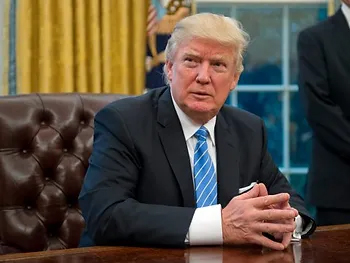The Middle East is a mess all right, but Trumpification may not be such a bad idea .
Germany’s foreign minister, Sigmar Gabriel, recently spoke out against what he called the “Trumpification” of the Middle East.
“The recent massive arms deals President Trump made with the Gulf monarchies exacerbate the risk of a new arms race … I am very concerned by the dramatic escalation of the situation and the consequences for the whole region,” Minister Gabriel said.
He was referring to the White House siding with Saudi Arabia and the United Arab Emirates against Qatar for its evident support of Iran and jihadist terror via the Muslim Brotherhood. This has built into quite the standoff and the resulting blockade has had ripples throughout the region. The Qatari riyal has taken a beating and they are seeing compensation for the blockade. In addition to the Saudis and UAE, Bahrain, Egypt, Maldives and Yemen have all cut ties with Qatar.
It’s a mess all right, but with due respect to the Germans and other critics, Trumpification may not be such a bad thing. In taking a hard line against Doha, the President is continuing the Bush doctrine, that the U.S. “should make no distinction between terrorists and the nations that harbor them–and hold both to account.” Secretary of State Rex Tillerson is within his purview to try to negotiate a solution to this standoff, after the proper lesson has been learned, but despite his evident misgivings and indignation about the key role played by Trump son-in-law and key advisor Jared Kushner, he should support his boss on this.
Trump reportedly doubled down on his position in a call with Gulf region leaders. According to the White House, as reported by Reuters, “”He reiterated the importance of stopping terrorist financing and discrediting extremist ideology. The president also underscored that unity in the region is critical to accomplishing the Riyadh Summit’s goals of defeating terrorism and promoting regional stability,” the White House said.
“President Trump, nevertheless, believes that the overriding objective of his initiative is the cessation of funding for terrorism,” it said.
In addition to its links with the Egypt-based Muslim Brotherhood, Qatar has also nurtured ties with Israel’s most fierce enemy, Hamas, under the claim that it is trying to promote more engagement and moderation. (That claim was bolstered by a recent Hamas statement that seems to accept a two-state solution, albeit one that does not formally recognize Israel.)
Yes, it was disappointing that the president has shelved his campaign promise to move the US embassy to Jerusalem.
But he certainly made a solid statement about Jerusalem as the first sitting president to visit the Western Wall. And there’s much else to like about the emerging Trump Middle East policy. Unlike his predecessor, he acted quickly when Syria crossed the imaginary ‘red line’ by gassing civilians, launching a quick and punishing airstrike.
He also seems to take the more realistic view of the region and what our goals there should be.
Writing in Politico, Steven A. Cook of the Council on Foreign Relations noted that Trump’s policy “reflects a sound understanding of what the United States can achieve in the region and, importantly, what it cannot.”
Noting that Western efforts to promote democracy that led to the Arab Spring produced more fractured societies but no real change agents, Cook adds “The Trump administration seems to understand this and has pragmatically shifted American policy to achievable goals like rolling back the Islamic State and challenging Iran’s efforts to extend its influence around the region.”
Those who believe Trump, a businessman and political amateur is not a serious president with real policy goals may dismiss his Mideast stance.
But it suggests a practical view of the fight against ISIS recognizing that, other than democratic Israel, there are no other perfect allies in the Middle East.
The 9-11 hijackers were Saudi and the country has a troubling history of terror support. However, Iran is worse in that their leaders continue to make threatening statements against Israel and the US while almost surely planning to resume their nuclear arms quest as soon as they can get away with it. While he’s keeping the John Kerry-brokered nuclear deal in place for now, President Trump is avowedly pessimistic about it.
The Saudis, on the other hand, have growing, low-key ties with Israel based on strategic interests and common enemies.
Given the disastrous Middle East policy of Barack Obama, which entailed alienating Israel while cozying up to and placing misguided trust in Iran, and chasing pipe dreams about the spread of democracy if we just talk nicely to people and avoid saying “Islamic terror,” Trumpification seems to me to be potentially one of the best processes to come along in years.



